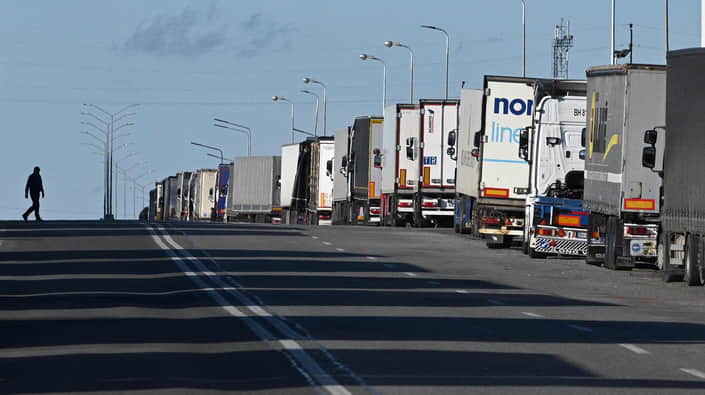Price of Blockade: Consequences of Protest on Ukrainian-Polish Border

The Ukrainian-Polish border has been effectively blocked for over a week now.
Polish hauliers – specifically the recently formed "Committee to Protect Transporters and Transport Employers", which is linked to the anti-Ukrainian Confederation party – are obstructing the operation of three key border crossing points with Ukraine.
The Yahodyn-Dorohusk and Rava-Ruska-Hrebenne border crossing points are closed in both directions, while Krakovets-Korczowa is only closed for entry to Ukraine.
The blockade, which began at noon on 6 November, has left approximately 20,000 vehicles stranded at the border, unable to reach their destinations (according to data from the Ukrainian Ministry of Infrastructure).
The Polish customs service, on the other hand, reports that as of 9 am on 10 November, there were about 1,300 vehicles in the queue to leave Poland at Yahodyn-Dorohusk, 550 at Rava-Ruska-Hrebenne, and 520 at Krakovets-Korczowa.
Ukrainian officials have attempted direct negotiations with the border blockers, but to no avail.
"We have not reached any agreements. The Ukrainian side does not consider our demands," said Rafał Mekler, the protest organiser in Dorohusk (who is also the head of Confederation’s Lublin branch).
Since the protesters' demands are unacceptable to Ukraine, the chances of reaching a compromise are clearly limited.
The question is: what is this blockade costing the Ukrainian economy, and which sectors will be the worst affected?
Firstly, direct losses – the losses incurred by Ukrainian hauliers who cannot fulfil their contracts.
According to Oleksandr Kyryluk, director of the International Freight Department at the logistics group Zammler, each day of downtime for a truck costs Ukrainian hauliers 300-350 euros in operating expenses.
Statistics on road crossings in the eSchliakh (eQueue) system for October show that on average, 1,140 road haulage vehicles were crossing Polish border checkpoints per day. The three currently blocked crossing points allowed an average of 960 vehicles to pass through in October, accounting for 84% of the total crossings on the Polish border. Another 285 empty vehicles left through two other crossing points per day.
Of these 960 vehicles, some promptly rerouted, heeding the protesters’ warnings, and headed for other borders. Some managed to pass through, while others are now stuck in queues at the border. For example, between 7 and 10 November, an average of 70 vehicles per day crossed the border at Yahodyn-Dorohusk. Krakovets-Korczowa and Rava-Ruska-Hrebenne saw 270 and 74 vehicles cross respectively.
That means that approximately 546 vehicles at these three border points per day were unable to cross the border and got stuck in the queue. If we multiply this by 300 euros, it gives a direct loss of 164,000 euros per day due to downtime.
This is just the tip of the iceberg, as Ukrainian losses are not limited to the hauliers' losses only.
The overall amount lost will be much larger, encompassing risks for businesses, exporters and importers. Non-compliance with contracts and production shutdowns will be an inevitable outcome of this scenario.
Considering that only one border crossing point for trucks, Shehyni-Medyka, is still open on the Polish border, the export and import of goods will be significantly complicated. In October, 36% of propane-butane imports, 18% of gasoline and 16% of diesel fuel were transported by road. Although the protesters have promised to let fuel tankers through, the blockade may lead to a shortage of certain types of fuel and other goods, affecting the market and consumption.
The impact on the export of agricultural products, however, may be insignificant. According to September data (October data is not yet available), only 7% of total agricultural exports were transported by road. The primary means of transportation for agricultural exports are railways (64%) and ports (26%). Therefore, the Polish hauliers’ blockade is not expected to significantly affect the export of grain and other agricultural products, and existing flows will be redirected to other routes.
Grain traders are reporting that due to the blockades and obstacles on the Polish border, truckers have already ramped up the volume of freight transportation through Hungary and Slovakia. Unfortunately, the volume transported across the Romanian border cannot be increased due to rebuilding work at the largest crossing point, Porubne-Siret.
The biggest losers of this blockade are exporters, but not agricultural exporters. Interpipe, for instance, uses over a thousand vehicles per month to export its metal products, mainly by road. Similarly, manufacturers of glass containers export them to European plants by truck. Other goods transported by road include timber, furniture, food, pharmaceuticals and more.
Consequently, Ukrainian customs and, in turn, the country's budget are suffering alongside the exporters. Importers, especially of fuel, plastic products and food, are also being adversely affected.
This implies that Polish businesses are also incurring losses from this blockade.
These losses are likely proportionate to those being experienced by Ukrainian businesses. For this reason, mayors and border police in Polish cities are urging the protesters to stop. For example, the mayor of Lubycza Królewska and the police chief of Tomaszów Lubelski, located on the DK17 route leading to Hrebenne, have called for an end to the blockade. Police in Dorohusk have asked the mayor to disperse the protest as they fear they might not be able to control a group of Ukrainian drivers attempting to break the blockade by force.
In this situation, a swift removal of the blockade is in the interests of both Kyiv and Warsaw. The governments of both countries need to respond urgently, seeking ways to resolve the conflict and restore normal border traffic before the economic consequences get any worse.
Articles in the 'Expert Opinion' section are not editorials, and the views presented are solely those of the authors
